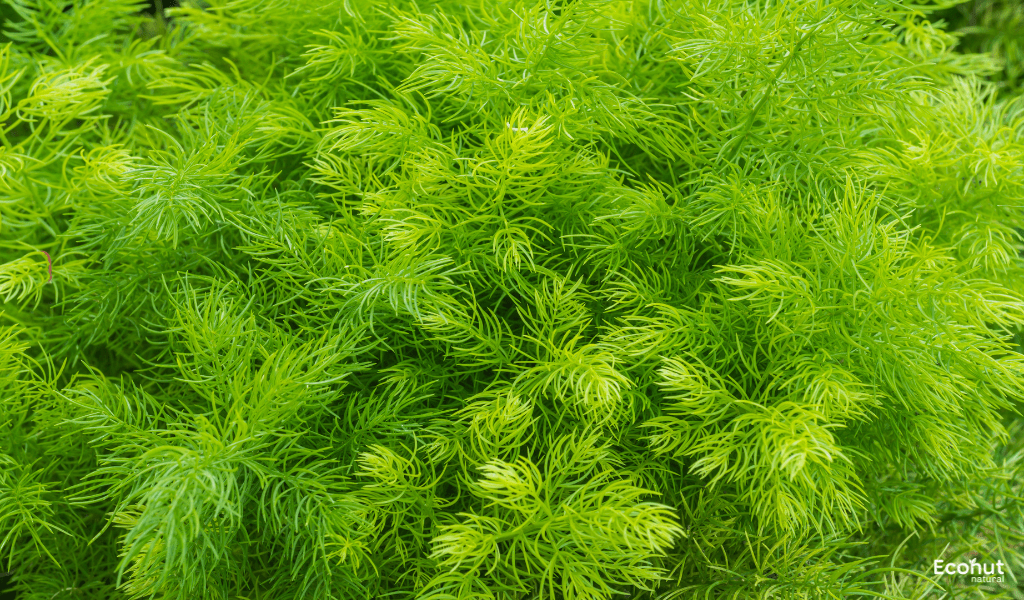The perennial climbing plant known as Shatavari (Asparagus racemosus) plant can grow up to two meters tall and has both straight and hooked spines. This herb has a bittersweet taste. Its juvenile stems are fragile and easily broken off. Fragrant Shatavari blooms with short spikes and a white tint. Shatavari roots are white, tuberous, radish-shaped, and taper at the end. They grow in clusters.
shatavari aids in weight gain because of its Balya virtue and increases immunity because of its Rasayana (rejuvenating) property.
Description
Shatavari is a well-known plant that has been utilized for millennia in Ayurvedic therapy. Shatavari has historically been utilized to promote women’s health, particularly reproductive health.
Botanical Name:
Asparagus racemosus
Family:
Asparagaceae
Leaves:
Shatavari’s fern-like leaves are glossy green, flat, and oblong. They are around 3-5 inches long and 2 inches wide, with a bitter flavor. There are noticeable palmate veins extending from the center of each leaf.
Flowers:
The plant bears racemose clusters of tiny, white, bell-shaped blooms. These fragrant, slightly pink-tinged flowers often bloom in June and July during the summer.
Stems:
The climbing vine known as shatavari has a maximum length of 4 meters. The green, slender stems contain tiny spines that run the length of them.
Roots:
These are the fleshy, thick subterranean storage organs. They feature tapering shapes at both ends and can reach a length of one meter. “Hundred roots” is how the word Shatavari actually means, referring to the many tuberous roots that can grow on a single plant.
Habitat:
Shatavari plants are found in tropical and subtropical forests. Soils that are light, medium, or heavy can all support the growth of this plant. It is most commonly found in Asia (the Himalayas, Nepal, Pakistan, India, Sri Lanka, Australia, and Africa). The most common states in India are Kerala, Tamil Nadu, Andhra Pradesh, Karnataka, Gujarat, Odisha, and West Bengal. Deforestation threatens to wipe out the plant in its native habitats.
Parts Used:
- Roots
- Leaves
Dosage
- Powder – 3-6 grams per day
Chemical Constituents
Root – Asparagamine A, sitosterol, two spirostanolic, two furostanolic sponins, and sarsapogenin
Fruits – B- sitosterol, Sarsasapogenin, Diosenin, Asparamins A & B
Leaves – Flavonoids, Rutin
Common name:
Shatavari, Asparagus root, Indian asparagus
Other Language Names of Shatavari (Asparagus racemosus)
Konkani name – Satavari
Assamese name – Satomul
Bengali name – Satamuli, Satmooli, Sainsarbel, Shatavar
Gujarati name – Shatavari
Malayalam name – Sathavari
Manipuri name – Nunggarei
Urdu name – Satawar
Arabic name – Shakakul, Shaqaqul
Chinese name – Tian Men Dong
Nepalese name – Kurilo
Hindi name – Shatavari
English name – Buttermilk Root, Climbing Asparagus, Wild Asparagus
Kannada name – Majjige Gadde
Tamil name – Sadavare
Marathi Guajarati name – Satavari
Oriya name – Vari, Pali
Punjabi name – Chhotta Kelu
Scientific Classification
| Kingdom | Plantae |
| Subkingdom | Tracheobionta |
| Order | Asparagales |
| Family | Asparagaceae |
| Genus | Asparagus |
| Species | Asparagus racemosus |
Ayurvedic Properties
Hindi/Sanskrit
- Rasa -Madhura, Tikta
- Guna -Guru, Snigdha
- Virya -Sheeta
- Vipaka -Madhura
English
- Taste -Sweet, Bitter
- Physical Property-Heavy, Oily
- Potency- Cold
- Metabolic Property (After Digestion)-Sweet
Shatavari (Asparagus racemosus) Uses
- Shatavari has antiviral and antibacterial properties that help prevent diarrhea, cholera, typhoid fever, and Staphylococcus aureus.
- This herb can be taken by women who have had a hysterectomy and increase the amount of breast milk that moms produce.
- It is an excellent natural antioxidant that aids in the body’s detoxification.
- Shatavari has antiviral and antibacterial properties that help prevent diarrhea, cholera, typhoid fever, and Staphylococcus aureus.
- By boosting the body’s immune system, which can defend against harmful effects like stress, this plant helps reduce stress.
- This herb fortifies the body and helps to sustain a healthy level of energy.
Shatavari (Asparagus racemosus) Benefits
Diabetes:
Shatavari (Asparagus racemosus) roots are a great source of antidiabetic agents because they raise the body’s production of insulin, which lowers blood sugar levels.
Helps with Breast milk production:
Little milk supply in young women typically makes it difficult for them to nurse their newborns. Numerous factors, like anemia, low blood pressure, or just stress, might cause this. Milk production can be facilitated and regulated by taking Shatavari on a daily basis. This is the best way to nurture newborns so that their immune systems get stronger. Since shatavari is a natural herb, children are not harmed by it.
Shatavari Enhances Libido:
Proud to be a natural aphrodisiac, shatavari boosts libido in both men and women by stimulating the hormones that cause mental tension and anxiety to decrease. In men, it also boosts virility and stamina.
As a diuretic:
Herbs or chemicals known as diuretics cause the body to expel water more frequently; shatavari is particularly beneficial if you’re searching for a natural detoxifier. It improves the way your body functions by removing excess water and toxins from it. Moreover, the kidneys would be cleansed by the body eliminating excess salt and water; research on animals indicates that shatavari root extracts taken orally can aid in this process.
Gastric problems can be cured:
Gastric issues are known to be treated by shatavari. Shatavari’s dried roots are ground into a powder and used to make a juice. This juice can effectively treat ulcers and other gastrointestinal disorders when consumed. This herb can help treat gastroparesis if taken on a regular basis.
Shatavari (Asparagus racemosus) Side Effects
Allergic Reactions:
Shatavari allergies may occur in people who are allergic to asparagus or other plants in the Asparagales family, such as onions, leeks, or garlic. Rash, itchy skin and eyes, lightheadedness, rapid heartbeat, and exacerbation of asthma are some of the symptoms.
Diuretic Effect:
Shatavari could cause more urination. In certain circumstances, this may be helpful, but in order to prevent imbalances, it’s crucial to stay hydrated and avoid taking it with other diuretics, or water pills, or drugs that can deplete potassium.
Blood Sugar:
According to some research, Shatavari may help reduce blood sugar. Before using Shatavari, check with your doctor if you take blood sugar-controlling drugs or have diabetes.
Pregnancy and Breastfeeding:
The safety of Shatavari during pregnancy and lactation has not been thoroughly studied. Except in cases where a medical professional recommends differently, it is advisable to avoid it.
Read Also: Coriander (Coriandrum Sativum)- Benefits and Side Effects
Conclusion
Because of its immense health advantages, Shatavari, often known as “the Queen of Herbs,” has been listed as the ultimate treatment in various ayurvedic books from the beginning of time. Stress and anxiety can be normalized with the aid of this amazing medical herb, which is categorized as an adaptogen. It is a powerful aphrodisiac that improves the reproductive health of both men and women, increases libido, and treats a variety of infertility issues. Additionally, it addresses eye issues, guarantees that the heart functions properly, manages diabetes, facilitates digestion, and boosts immunity and general stamina.
FAQS
What is Shatavari (Asparagus racemosus) used for?
There may be antibacterial and antioxidant properties to asparagus racemosus. Additionally, it may strengthen the immune system. Asparagus racemosus is used for many different purposes by people, including lactation, HIV/AIDS, diabetes, and sports performance.
Is taking Shatavari on a daily basis safe?
Shatavari extract is usually taken as 30 drops in juice or water, up to three times a day. Before including shatavari in your routine, especially if you use medication or have health issues, consult your doctor or a natural health practitioner.
Is there any adverse impact of Shatavari?
Too much of it could result in certain issues. Individuals who are allergic to any member of the asparagus plant family should not take Shatavari supplements. These allergic reactions can manifest as rashes, itchy skin and eyes, lightheadedness, rapid heartbeat, or exacerbation of asthmatic symptoms.

